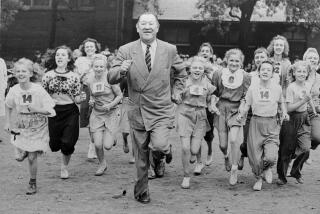Swimmer Seeks ’72 Olympic Gold : Olympics: Appeal asks that disqualification for positive test of asthma medication be overturned.
- Share via
Rick DeMont, whose positive drug test for an asthma medication in the 1972 Summer Olympics at Munich resulted in one of the most controversial episodes in the Games’ history, is launching a campaign to have his gold medal returned 23 years later, The Times has learned.
DeMont, then a 16-year-old swimmer from San Rafael, Calif., was stripped of his medal in the 400-meter freestyle and disqualified from competing in the 1,500-meter free, an event in which he held the world record.
Since then, DeMont maintains his positive test for the asthma medication resulted from inadvertent use. He had mentioned on his Olympic processing form that he took the medication Marex, which contained the banned stimulant ephedrine.
But with Olympic drug testing in its infancy, U.S. officials were caught unaware and unable to present a strong appeal.
DeMont, 39, swim coach at the University of Arizona, has tried before to change the ruling.
“We’re not ready to go yet, but we’re preparing something,” said Steve Wood, a Northern California lawyer and former Olympic swimmer who is helping DeMont present a document supporting his cause.
“The most significant issue in swimming today is not Rick DeMont, it’s doping in the international community. We don’t want to undercut that. We [also] realize in ’72 the worst tragedy wasn’t Rick, but the Israeli massacre.”
Wood said he and DeMont do not want the three medalists in the 400 meters to lose their places.
“We want history to declare Rick a co-winner,” Wood said.
Bradford Cooper of Australia, who finished .01 of a second behind DeMont, was awarded the gold. Southern California swimmers Stephen Genter and Tom McBreen reluctantly accepted the silver and bronze, respectively.
The latest campaign will focus on the fact that ephedrine was not a performance-enhancing agent in the doses DeMont used.
DeMont is hoping to present a case before IOC officials after enlisting the support of the international swimming federation, U.S. Swimming and the U.S. Olympic Committee next month.
But Anita DeFrantz, a member of the IOC executive board and president of the Amateur Athletic Foundation in Los Angeles, was skeptical a hearing would take place.
“What good would it do?” she asked. “He may have been innocent, but unfortunately his urine wasn’t.”
The IOC has maintained DeMont’s ephedrine levels were too high to be considered inadvertent use.
Robert Helmick, past USOC president and manager of the U.S. water polo team in Munich, said he encountered resistance when he tried to help DeMont while serving as IOC executive board member.
“My instinct was they were just covering up and just didn’t want to open it up,” Helmick said. “Everyone I talked to involved with that sorry affair wanted to wash their hands of [it] and never have it brought up again.”
More to Read
Go beyond the scoreboard
Get the latest on L.A.'s teams in the daily Sports Report newsletter.
You may occasionally receive promotional content from the Los Angeles Times.




